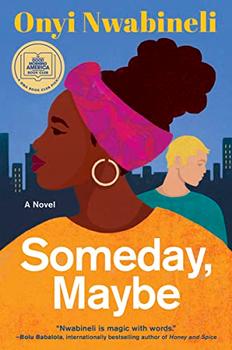Summary | Excerpt | Reading Guide | Reviews | Beyond the Book | Readalikes | Genres & Themes | Author Bio

A Novel
by Onyi Nwabineli
I slip our well-worn copy of Run Lola Run into the DVD player (because Q insisted that DVDs could live alongside streaming services in perfect harmony) and watch it start to finish in a continuous loop. And I imagine a series of alternate futures for Q and myself; futures where he lived like he was supposed to. In my little scenes, there are the usual things most married couples imagine for themselves: trips and birthdays, house improvements and career advancements, but mostly I dream of simple things like calling in sick to work so we can spend the day in bed or having someone handle the spiders who act like they pay rent. It's a future full of moments like this I would sell skin to have back.
I focus on the back of Lola's head as she races around a corner and ignore my sister, Gloria, who stands beside my bed with a plate of food I won't eat.
"Eve," she says, "this has to be the sixth time you've watched this today, love." Her voice is gentle. A voice that has quelled a thousand toddler tantrums and stilled courtrooms across the country. She is right to use it here. My behavior is bizarre, and what people cannot understand, they fear, more so when five days prior, the person in question was able to dress herself and form coherent sentences.
I say nothing but reach under his pillow and drag out Q's sleep sweatshirt—a gray thing with frayed sleeves. My stomach bottoms out as soon as I pull it over my head. Wood and soap and the slightly acidic tang of photo-developing chemicals—his own scent. I curl into a ball, desperately pressing the sleeves to my nose, wishing I could conjure him back into existence, and when I start to cry, Gloria draws the duvet up and curls around me until I fall asleep.
* * *
To grieve is to frighten the people you love. My behavior seems to have scared my husband's name right out of my family's vocabulary. They treat me like a patient afflicted with a nameless disease. But patient or not, they do not leave me in peace.
"Please try," Gloria stage-whispers from my bedside. Two days have passed since I took to my bed and I have neither spoken nor moved. "Ma is constantly speaking in tongues. If you get out of bed, she'll stop."
My mother loves Jesus. Therefore, she does not get stressed; she gets holy. Straining, I can hear her milling about the kitchen uttering a stream of spiritual gibberish. She must be beside herself. I respond by wrapping Quentin's sweatshirt around my face. Gloria eventually disappears. But not for long. Since I ignore all the advice offered to me—to eat, wash, move—since this particular case of misery eschews company, and since Gloria pioneered Nigerian guile, she sends in my niece and nephew to hold my hands and stare at me with wide eyes until I am moved to sit up.
I drag my heavy limbs into the bathroom, where I spend half an hour in the shower, trying to sluice the cloying stench of loss and sadness from my skin. Using your own children as soldiers to fight your emotional battles is the type of tactic that will see Gloria rule over us all one day.
As I exit the bathroom, I hear my phone ringing and I can be forgiven, can't I, for thinking, just for a second, that it's him. My mind races for the familiar. I know Quentin is dead. But I fall into that gap between reality and memory. I forget about the police and the blood, and my husband's lips—lips I had kissed mere hours before—cold, blue and lifeless. The time I have spent sweating under our duvet evaporates. He is on his way home, swinging by Sainsbury's to pick up a cheesecake in lieu of dinner because he is a man and, as such, lacks the gene that produces common sense. Nobody tells you that irrational hope is a side effect of grief. And they should because it is dangerous.
I run into our bedroom, calling his name, voice made bright by the mad, delusional happiness rearing up inside me; felled when I reach my phone and see Aspen's name flashing on the screen. The mistake hardly warrants my reaction, which is to pause as I understand that it is not, in fact, my husband, but the person I would rather remove my fingernails than address, and then I scream for so long Dad calls in an emergency prescription of diazepam. These are the perks of having a doctor for a father. Hands on my shoulders and my wrists wrestle me from the floor to my bed. My towel slips. My scream turns to a howl.
Excerpted from Someday, Maybe by Onyi Nwabineli. Copyright © 2022 by Onyi Nwabineli. Excerpted by permission of Graydon House. All rights reserved. No part of this excerpt may be reproduced or reprinted without permission in writing from the publisher.
Your guide toexceptional books
BookBrowse seeks out and recommends the best in contemporary fiction and nonfiction—books that not only engage and entertain but also deepen our understanding of ourselves and the world around us.